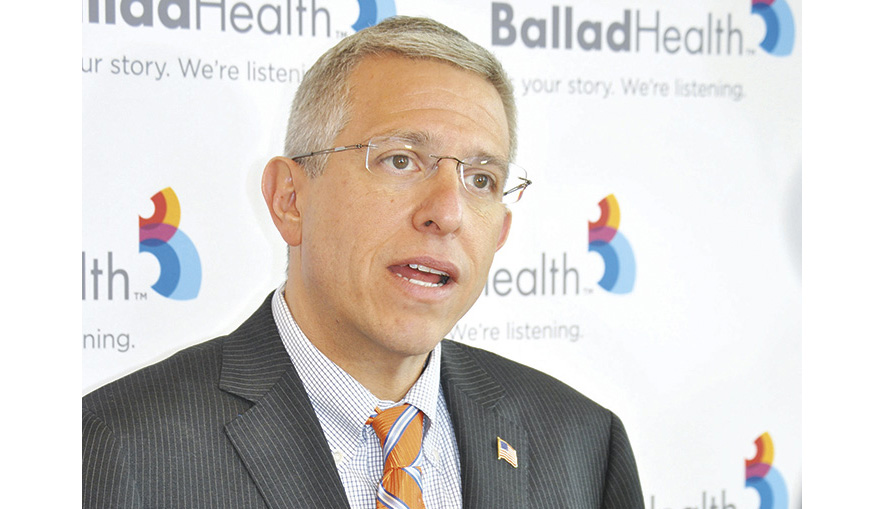Alan Levine
By Scott Robertson
In a healthcare economy in which the closure of rural hospitals is becoming more common, Ballad Health plans to partner with a hospital authority to reopen a small rural hospital that has been closed for more than five years.
Lee County Regional Medical Center (LCRMC), a Pennington Gap, Va., hospital, was shuttered by Wellmont Health System in 2013 and never reopened under the auspices of Americore from 2016 through 2018. The hospital authority voted Jan. 29 to enter into negotiations with Ballad Health to reopen in 2019. Just hours before that, the Ballad Health board of directors had voted unanimously to authorize management to negotiate a definitive agreement with the authority.
“We will now commence putting the terms together,” Ballad Health Executive Chairman, President and CEO Alan Levine said Wednesday. “Both of us want to get this done, so I don’t anticipate the negotiation of the terms will take that long.”
Ballad committed during the merger of Wellmont and Mountain States Health Alliance to provide services for the population previously served by LCRMC in the event the hospital could not be reopened under Americore or another provider. Now the question is what level of service Ballad will provide.
Virginia law mandates provision of the following essential services:
• ER stabilization for patients
• Emergent obstetrical care
• Outpatient diagnostics needed to support emergency stabilization of patients
• Rotating clinic or telemedicine access to specialty care consultants as needed in the community
• Helicopter or high acuity transport to tertiary care centers
• Mobile health services for preventive screenings, such as mammography, cardiovascular and other screenings
• Primary care services including laboratory services
• Care coordination service
• Access to a behavioral health network of services through a coordinated system of care
• Community-based education, prevention and disease management services for prioritized programs of emphasis based on goals established in collaboration with the commissioner and the authority.
Levine said beyond that, Ballad would work with the Commonwealth of Virginia on possible funding models within the Medicaid program to optimize reimbursement. “We will need the Commonwealth’s help on that,” Levine said. “I believe they want to be helpful. There is still work to be done, but I feel pretty good about where we are.”
While some hard feelings in the small Virginia community may remain toward Wellmont – one of the two systems that merged to create Ballad in 2018 – for having closed the hospital years ago, Levine was confident the community will understand Ballad’s business model is very different from Wellmont’s 2013 model.
“The old model for hospitals was about bricks and mortar and as much inpatient care as possible,” Levine said. “Today’s – and the future’s model of a rural hospital is knowing the unique health conditions in that community and determining the services we can provide that are either preventative in nature or educational in addition to providing some limited inpatient services so the patients and their families don’t have to travel a great distance.
“Most important is access to emergency care,” Levine continued. “Obviously, our board will have to approve the final definitive agreement, as will the authority, but assuming those things are approved – for people to have to travel 30-45 minutes to have basic emergency care – we have never thought that was ok.
“We wanted to make this investment because it feeds well into our system and our sustainable model. But on its own, it wouldn’t make sense, and no one would do it,” Levine said. “That’s the essence and the benefit of the merger. If anything crystalizes it, that’s it. By itself, Wellmont could not sustain that hospital – and possibly a few others – and Mountain States was facing the same issues. Together, when you eliminate unnecessary duplicative costs, you generate the resources to invest in creating basic rural access.
“When we went to the states about the merger, we said, and this was in our documents, ‘without the merger, rural hospitals will likely close. With the merger, they won’t.’ Now, we never committed to opening any new hospitals, but here we are, going beyond what our commitment was. We also did that in Unicoi County, where we kept our word and opened a new rural hospital there. Again, financially, if we were a for-profit company like HCA or Community Health Systems, we would not be doing this.”
By working with the Commonwealth on reimbursement, Levine suggested, Ballad will likely be better off working with Lee County than existing under the status quo with LCRMC remaining closed.
“We’re taking care of everybody in Southwest Virginia whether they have coverage or not,” Levine said. “We were going to take care of these people whether Lee Regional opened or not. They’re showing up at our hospitals.”
“We have doctors in Lee County that we employ,” Levine continued. “So, we have been taking care of these people without reimbursement.”
Levine declined to put a date certain, or even to set a goal by which the board and the authority will be able to vote on a definitive agreement. “I don’t want to create an expectation that we might miss,” he said, “but we are interested in getting this done as soon as possible.”




